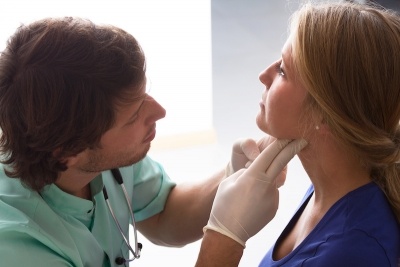
Oral, head and neck cancer is cancer that begins in the internal tissue of somewhere in your mouth, neck or head -- excluding cancers of the eye, skin, and brain. The major areas that are usually affected by this type of cancer include:
- sinuses
- nasal cavity
- salivary glands
- pharynx (the part of the upper part of the throat that's right behind the mouth)
- larynx (the lower part of the throat that holds the voice box)
- gums
- cheek lining
- lips
- floor of mouth
- hard palate
- gum behind the wisdom teeth
Oral, neck and head cancers are widespread, but luckily, are all treatable forms of cancer, particularly if detected early through regular screenings and routine medical care.
Symptoms of Oral, Head and Neck Cancers
Whether it is neck cancer, oral cancer, or head cancer, symptoms of each of these diseases will present themselves in several ways:
- In the mouth, you may see red or white patches or swelling.
- In the sinuses, there might be chronic infections that won't go away, nose bleeding, headaches, pain in the upper teeth and swelling around the eyes.
- In the salivary glands, people will feel numbness or paralysis around the face and chin.
- In the pharynx, it causes frequent headaches and ears that ring consistently.
- In the larynx, patients report trouble swallowing and ear pain that won't go away.
Who is at Risk for Oral, Head and Neck Cancers?
If you want to lower your risk of cancer in your head or neck, it helps to understand common causes and remove risk factors wherever possible. The following factors have been proven to lead to the development of cancer in the body.
- Tobacco use can also drastically increase your risk of getting these types of cancers. Tobacco use includes smoking cigarettes, chewing tobacco, or inhaling it through pipes or cigars. Research shows that 85% of head and neck cancers are due to tobacco usage. Cancer experts believe that people who use tobacco and alcohol together are at a greater risk of developing head, neck and oral cancers.
- One cause of cancer in the mouth or throat is is HPV, or the human papillomavirus. This is a sexually transmitted disease that young adults can get a vaccine for (for a certain strain of the disease). HPV-induced throat cancer is most commonly diagnosed in non-smoking, middle-aged, white males who have repeated neck masses that don't go away after antibiotics. According to the CDC, HPV (particularly HPV type 16) causes 70% of all oropharyngeal -- or throat -- cancers in the U.S.
- Studies show that drinking alcohol is another risk factor for oral, head and neck cancer. According to the CDC, drinking any kind of alcohol, including wine, beer, or liquor can lead to cancer, and the National Cancer Institute reports that "people who consume 50 or more grams of alcohol per day (approximately 3.5 or more drinks per day) have at least a two to three times greater risk of developing these cancers than nondrinkers."
Tips for Lowering Your Risk of Oral, Head and Neck Cancers
To help lower the risk of getting one of these cancers you can take steps to reduce your exposure to those things known to make you more likely to develop one of these cancers.
- Cut back on alcohol (or cut it out totally). The American Cancer Society recommends no more than 1 drink per day for women and 2 drinks per day for men.
- Stop the use of tobacco.
- Practice safe sex.
- Be sure that you stay on top of your healthcare routine, and see your doctor and dentist regularly to have your mouth, head, and neck examined. By seeing your health care practitioners regularly, you can ensure that you are not developing one of these conditions, and start treating them early if you are. If you have strange or uncomfortable symptoms in your head, mouth or neck; visit an ear, nose and throat specialist who can examine you and make sure that you are healthy.
By living a healthy life, cutting down on alcohol and tobacco, practicing safe sex, and ensuring you make regular visits to physicians who can take care of you, you can minimize your risk of getting these cancers -- and properly and effectively treat them if you do.
If you have any other questions or concerns about your risks of head cancer, oral cancer or neck cancer, and you are in the Portland, OR or Vancouver, WA areas please contact us at Compass Oncology to schedule an appointment.
For more information on lip and oral cancer including diagnosis, staging, and treatment options, click on the provided text links.



